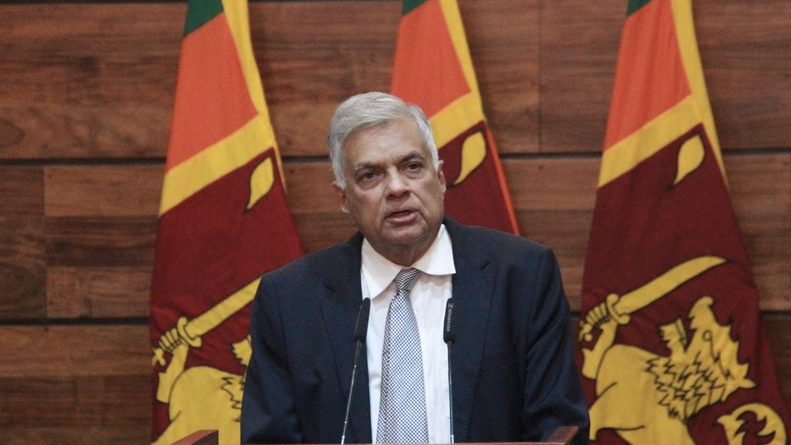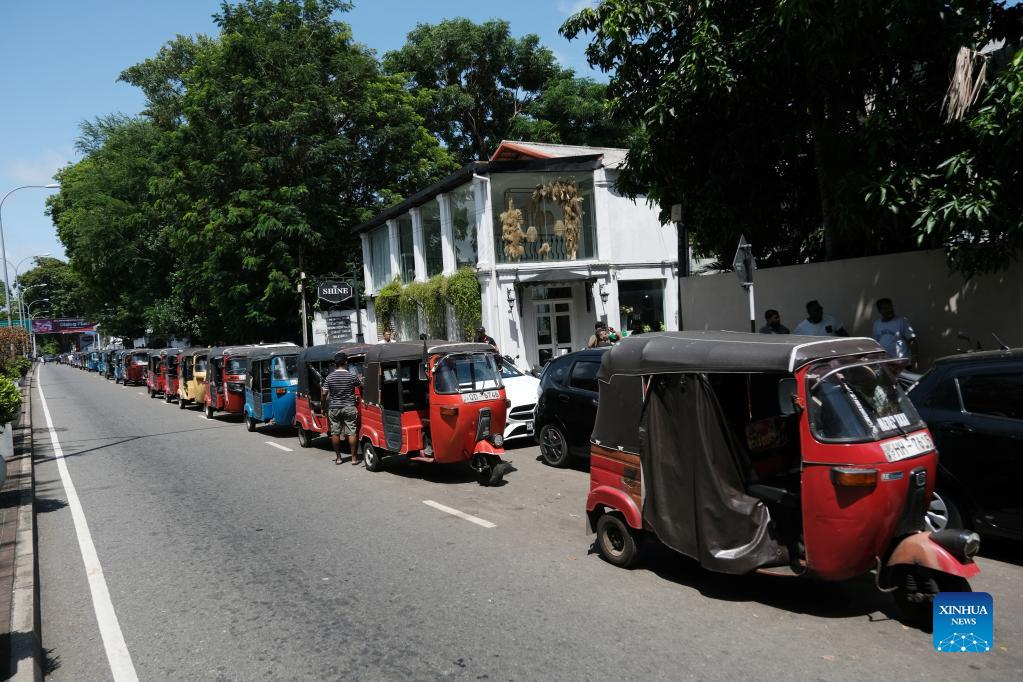
Sri Lanka's new president Ranil Wickremesinghe. /Xinhua
Sri Lanka's new president Ranil Wickremesinghe. /Xinhua
Editor's note: Rabi Sankar Bosu is an Indian contributor to Chinese media outlets. He writes about Chinese politics, social and cultural issues, and China-India relations with a special interest in the Belt and Road Initiative. The article reflects the author's views, and not necessarily those of CGTN.
The Indian Ocean island nation Sri Lanka is going through an unprecedented economic, social and political crisis. It is in the midst of its worst economic crisis in the last seven decades. With skyrocketing prices of daily essentials – from food to medicine, and from oil to milk, Sri Lankans are in dire straits. The economic and humanitarian crisis is pushing this country of 22 million into the abyss. A severe foreign exchange crisis has virtually crippled the island nation's entire economy.
In the last few months, the world has witnessed continuous protests demanding former President Gotabaya Rajapaksa's resignation with the slogan of "Gota Go Home." The violent collective agitation reached its climax when thousands of protesters stormed public buildings, occupied the Sri Lankan presidential and prime ministerial residences, while also setting some on fire on July 9.
Gotabaya left the country to avoid public anger. He resigned from abroad on July 14. The irony is that he secured a massive mandate in the 2019 presidential election. However, the July 9 protests forced him out from Sri Lanka for his mistakes.
The majority of Sri Lankans expressed their displeasure with the Rajapaksa government. They believe that the Rajapaksa political family bears sole responsibility for the country's economic collapse. Many economists say that if Sri Lanka is in such a mess today, it's because of rampant corruption and the political short-sightedness of the Rajapaksa government.
After Rajapaksa's departure, the 225-member Sri Lankan Parliament selected the United National Party (UNP) leader Ranil Wickremesinghe as the eighth executive president by secret ballot on July 20, 2022. It is reported that the new president obtained 134 votes.
The biggest question now in Sri Lanka is whether Wickremesinghe will be able to uphold the aspirations of Sri Lanka's people by overcoming the current financial hardship. Or, will he repeat the same mistakes Rajapaksha made during his presidency? The humiliating ousting of the former president may be a strong warning to the new president to find solutions for the painful problems Sri Lanka is facing right now.

People wait to refuel at a gas station in Colombo, Sri Lanka, July 18, 2022. /Xinhua
People wait to refuel at a gas station in Colombo, Sri Lanka, July 18, 2022. /Xinhua
However, many experts do not think that the economic crisis and social unrest that have arisen in the last few years will be resolved as the result of this presidential election. As the new president of Sri Lanka, Wickremesinghe has to contend with severe domestic issues. It will be an uphill battle to revitalize debt-ridden Sri Lanka's economy and to alleviate people's discontent.
A severe shortage of fuel imports, coupled with the inability to pay its international debt, created massive anti-government protests in Sri Lanka. As such, Sri Lanka urgently needs international assistance to deal with the current economic crisis. Therefore, the new government under President Wickremesinghe must restore political stability so that it can secure a rescue package from the International Monetary Fund (IMF), its bilateral partners, in particular, its close neighbors and development partners – India and China. It is worth mentioning that both India and China have helped Sri Lanka since the beginning to overcome the current difficulties.
Sri Lanka's economic crisis may be alleviated if the IMF and other international financial institutions come forward with some bailout packages to ease Sri Lanka's debt burden. Wickremesinghe, a veteran politician, must remember that political stability is crucial to obtain international aid.
It is difficult to improve the health of the financial system while the majority plays hegemonic power politics. The Wickremesinghe-led government must regain the trust of its minority communities. Government must be kept free from religion. It is hoped that he will not adopt radical minority hatred policy to stay in power as it could further adversely affect the country's ailing economy.
More importantly, the new government needs to do its best to raise the dollars needed to import essential goods, especially fuel. The new government needs to free the country's supply and distribution systems from hoarders and profiteers. The president-elect should not bow down to the forces hiding behind the protesters and rioters because anarchy will lead to economic instability. If the situation is unstable, the distribution of essential items like food, fuel and gas will be interrupted. The Wickremesinghe government needs to live up to the people's expectations of continuous supply of essential goods, not teargas.
It is hoped that the new administration will find a way to revitalize its crippling agriculture sector, which is one of its largest foreign currency earners. Furthermore, the new political set-up needs to work quickly so that common people are not used by anti-national elements to derail the process of returning to normality.
Sri Lanka needs to have its own recovery plan to overcome the ongoing crisis. Wickremesinghe should give priority to earning people's trust in order to put an end to the social unrest. The new president is expected to root out corruption so that hungry and angry Sri Lankans do not return to the streets to oust him like his predecessor.
Last but not least, Sri Lanka will not fall into the trap of any power block deviating from its long-held non-alignment policy.
(If you want to contribute and have specific expertise, please contact us at opinions@cgtn.com. Follow @thouse_opinions on Twitter to discover the latest commentaries on CGTN Opinion Section.)

